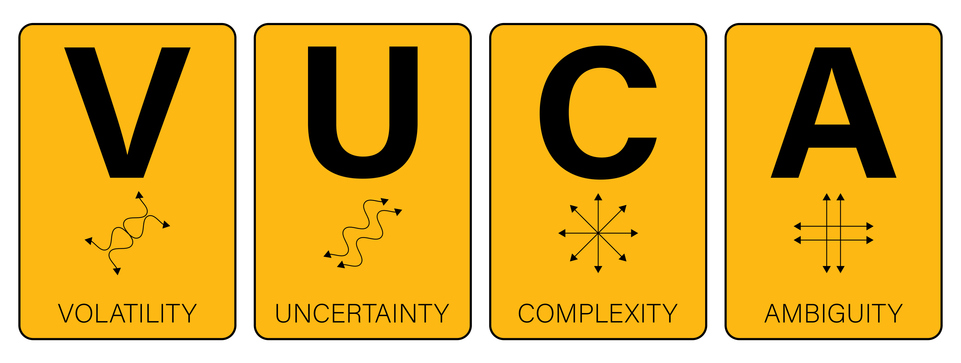We live in an increasingly Volatile, Uncertain, Complex, and Ambiguous (VUCA) world. Complex thinking is a valuable macro competency that all students and future professionals must develop to face humanity’s current and future challenges. It is the topic we addressed In the Observatory webinar of the Institute for the Future of Education (IFE), Ph.D. José Carlos Vázquez Parra explained the relevance of this competency for student training. In this article, I share a summary of his fascinating talk.
Students must prepare to face such relevant problems as climate change, migration, labor needs posed by Industry 4.0, scientific and technological advances, and their impact on our lives. They are challenges for which students need to develop equally proportional skills and competencies to face these complex situations. It is how Professor Vázquez explained it in our IFE Observatory webinar. If you did not have the opportunity to see it live, you can check it here and share it with your colleagues.
“Complex thinking is useful for making reasoned, innovative, and objective decisions.”
Complex thinking competency includes a set of cognitive skills for developing integrative thinking, that is, the ability to see the parts of a problem as a whole, i.e., a system formed by elements that interact with each other so that decision-making is as innovative and objective as possible.
Complex thinking comprises the following high-level cognitive skills:
- Systems thinking
- Critical thinking
- Scientific thinking
- Innovative or creative thinking
Linking artificial intelligence and complex skills development
Artificial Intelligence (AI) tools have many educational applications that we continue to explore. Still, this technology is not the first, nor will it be the last, to show us a more efficient way to get information and knowledge. Before ChatGPT, we had Google, Wikipedia, YouTube, MOOCs, talks by international experts, TED TALKS, and many technologies that facilitate gathering more information for our learning. Dr. Vázquez shares that these technological advances have led to the need to reassess education and the role teachers play in training processes. Also, new technologies have made us think and reflect on education’s purpose and the classroom as a space for educational interaction. Educational institutions must rethink the relevance of existing pedagogical models to train new generations and apply the necessary changes for efficient and quality student training.
“Using ChatGPT correctly, ethically, and efficiently implies skills and abilities.”
More than traditional linear learning, applying knowledge is critical to professional competency. A tool like ChatGPT, well used, can help us promote knowledge, but we also need to develop complex thinking to take this knowledge from a know-how-to-do to construct know-how-to-be (i.e., applying knowledge for understanding). Likewise, we need to generate assessment models beyond merely replicating information to measure competencies, as applied knowledge has become more relevant than acquiring traditional linear knowledge. Dr. Vázquez also told us that classrooms must represent through active learning the current world.
Transversality of complex thinking Competency
Complex thinking incorporates multiple competencies impacting social intelligence, communication, ethical and citizen sensitivity, and every discipline. It also develops valuable cognitive skills to make decisions and face problems with an argued, critical, systematic, innovative, and integrated perspective. To train for complex thinking competency, students must:
- Develop objective knowledge and use methodologies associated with their disciplines (scientific thinking).
- Recognize that the problems they confront occur in an integrated system (systems thinking).
- Have the ability to question and analyze the scenario considering different perspectives before making a decision (critical thinking).
- Be creative, considering the paths already traveled, to identify and propose new routes (creative and innovative thinking).
“The classroom must represent the complex reality experienced by professionals.”
Recommendations for institutions using artificial intelligence
The World Economic Forum suggests three elements that every university adopting AI should consider:
- The university must be one step ahead, know where to walk or evolve, and act, not just react.
- Promote students’ development of skills and attitudes, not just knowledge.
- The university must have flexible, continuously updated programs.
Additionally, Dr. José Carlos Vázquez Parra suggested the following for institutions using AI:
- Universities must promote the development of transversal skills and competencies for the individual, not just professional skills.
- Universities should generate proprietary knowledge and results through their research to present in their classrooms.
- Active learning with diverse collaborations makes classes more valuable than watching a video.
Complex thinking is an essential macro competency to leverage the opportunities provided by the correct use of artificial intelligence. According to Professor Vázquez Parra, teachers must train students to develop judgment for its correct use as a tool. Students need to be critical in the face of AI, know how to identify needs correctly, be clear about the elements they seek, have criteria, be sensitive to the needs of their environment, have social intelligence, know their reality, and be innovators. Complex thinking is a great way to appreciate AI as an element that implies cognitive needs. AI-based tools can help us promote knowledge; we develop complex thinking competency to know how to do and, from there, build understanding.
Relive this webinar. If your native language is not Spanish, you can activate the subtitles to translate the YouTube webinar reviewed in this article. To activate this option, on YouTube, select Subtitles (the subtitles will appear in Spanish), then select Settings ->Subtitles -> Translate automatically, and next, the language you prefer.
Ph.D. José Carlos Vázquez Parra (jcvazquezp@tec.mx) is a professor at the School of Humanities and Education and a researcher at the Institute for the Future of Education at Tecnologico de Monterrey. He is a member of the interdisciplinary research group R4C, which specializes in studying complex thinking competency and its sub-competencies. He leads the Social Entrepreneurship Learning for Complexity project, from which he investigates the relationship between social entrepreneurship and complex thinking.
This article from Observatory of the Institute for the Future of Education may be shared under the terms of the license CC BY-NC-SA 4.0 
)
)


)